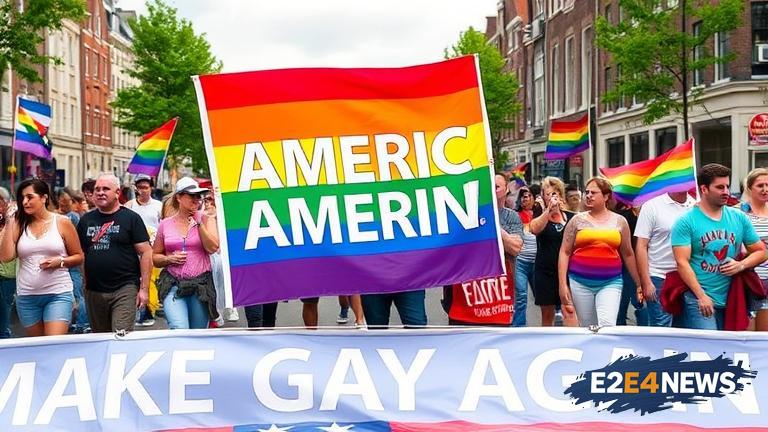The Amsterdam Pride march, a celebration of diversity and inclusivity, has taken a bold step by incorporating a political theme into its festivities. This year’s event featured a ‘Make America Gay Again’ theme, a play on the ‘Make America Great Again’ slogan popularized by former US President Donald Trump. The theme was chosen to highlight the struggles faced by the LGBTQ+ community in the United States and to show solidarity with those fighting for their rights. The march, which took place in the heart of Amsterdam, drew in thousands of participants and spectators, all united in their quest for equality and acceptance. The event featured a range of activities, including speeches, performances, and a parade, all of which helped to create a lively and festive atmosphere. Despite the celebratory tone, the march also served as a reminder of the challenges still faced by the LGBTQ+ community, both in the US and around the world. Many participants carried signs and banners calling for greater equality and an end to discrimination, while others used the event as an opportunity to raise awareness about important issues such as LGBTQ+ rights and HIV/AIDS. The ‘Make America Gay Again’ theme was seen as a powerful statement, one that challenged the divisive rhetoric and policies of the Trump administration. By embracing this theme, the Amsterdam Pride march sent a clear message of support and solidarity to the LGBTQ+ community in the US and beyond. The event also highlighted the importance of international cooperation and solidarity in the fight for LGBTQ+ rights. As one participant noted, ‘We are not just fighting for our rights in our own country, but also for the rights of our brothers and sisters around the world.’ The Amsterdam Pride march has a long history of promoting diversity and inclusivity, and this year’s event was no exception. The march has become an important symbol of the city’s commitment to LGBTQ+ rights and its reputation as a welcoming and inclusive destination. The event has also played a significant role in promoting tourism and economic growth in the city, with thousands of visitors flocking to Amsterdam each year to participate in the march and other Pride-related activities. Despite the many successes of the Amsterdam Pride march, there is still much work to be done in the fight for LGBTQ+ rights. Many participants at this year’s event noted that there are still significant challenges to be overcome, both in the US and around the world. These challenges include discriminatory laws and policies, as well as a lack of acceptance and understanding from some members of society. However, the Amsterdam Pride march serves as a powerful reminder that progress is possible and that the fight for equality and acceptance is worth continuing. As the LGBTQ+ community looks to the future, it is clear that events like the Amsterdam Pride march will play an important role in promoting awareness, understanding, and acceptance. The march has also sparked conversations about the importance of intersectionality and the need to address the unique challenges faced by marginalized communities within the LGBTQ+ movement. By embracing diversity and promoting inclusivity, the Amsterdam Pride march has become a model for other Pride events around the world. The event has also highlighted the importance of community and the need for LGBTQ+ individuals to come together in support of one another. As one participant noted, ‘The Amsterdam Pride march is a reminder that we are not alone and that there is a community of people who care about us and want to support us.’ The march has also sparked conversations about the role of social media in promoting LGBTQ+ rights and awareness. Many participants used social media to share their experiences and photos from the event, helping to raise awareness and promote the march to a wider audience. Overall, the Amsterdam Pride march was a powerful and inspiring event that highlighted the importance of diversity, inclusivity, and equality. The ‘Make America Gay Again’ theme served as a reminder of the challenges still faced by the LGBTQ+ community, but also of the progress that has been made and the hope for a more inclusive and accepting future.
